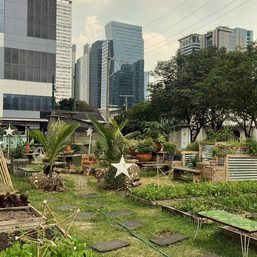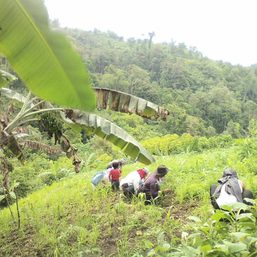SUMMARY
This is AI generated summarization, which may have errors. For context, always refer to the full article.
![[ANALYSIS] Transitioning from chemical to organic agriculture](https://www.rappler.com/tachyon/2021/05/Transition-chemical-organic-agriculture-May-5-2021.jpg)
The Philippines institutionalized organic agriculture with the passage of Republic Act No. 10068 (Organic Agriculture Act of 2010). This law was recently amended by RA 11511, which adopts the Participatory Guarantee System, a more affordable community or group-based organic certification process than third party certification.
While most welcome, the amended Act and its Implementing Rules and Regulations (IRR) do not address adequately the fundamental issue of how to wean away the 97-98% of producers (mostly small) from chemical-laced farming to natural, organic, and agro-ecological agriculture.
Under our current laws as well as in the International Federation of Organic Agriculture Movements (IFOAM), “organic conversion” starts when a farmer has stopped using agro-chemicals and ends when his farm enterprise is declared 100% organic or chemical-free, following a rigorous certification process. IFOAM and Asian Regional Organic Standards (AROS) for market-mandated certification require about three years of zero-use of chemicals.
Reaching this goal will take time and resources.
Meanwhile, consider this scenario: If all farmers adopt abruptly zero use of chemical fertilizer, yields may drop by as much as 50-60%. Many Filipinos will go hungry, unless we import a lot of rice (5 to 6 million tons of well milled rice, costing about P175 billion to P210 billion, at P35 per kilogram).
Clearly, an effective organic agriculture program must recognize the actual conditions of most farmers. It should assist farmers in undertaking a gradual, calibrated reduction of chemical inputs while progressively transitioning to a more robust or fully organic regime.
Our soil fertility has declined by almost 40 to 50%. Soil organic matter (SOM) currently ranges from 1.5 to 2.0% only. Our benchmark SOM in the transition process is 3%. Building up soil health (using crop/weed biomass recycling only) is slow. To arrest yield decline, a large amount of composted organic fertilizers or vermi-compost should be introduced. Chemical fertilizer (NPK) may be applied, together with micronutrients and farm-produced compost or humus, under a “balanced fertilization” regime. We emphasize farmer-made compost or humus, because buying them will cost a prohibitive P7,000 per hectare (P350/bag of 50 kilos x 20 bags).
Hence, the Department of Agriculture (DA) and Local Government Units (LGUs) should provide technical, financial, and other support, including bulk procurement of farm animal manure. Municipalities must encourage poultry or hog growers to sell their manure only in their localities. Under the Sagip Saka Law, LGUs may procure these manures and convert them into composted organic fertilizer for free or at-cost distribution to farmers.
Organic inputs like seeds and planting materials must also be provided to farmers to facilitate the transition process. For greater sustainability, farmers should be trained to produce and save their own seeds.
Starting in 2022, following the Supreme Court’s Mandanas case ruling, LGUs’ share in national tax revenue will increase by 27%. LGUs should now devote at least 10% of their increased Internal Revenue Allotment (IRA) for agriculture and fisheries programs, with at least one-fourth of the IRA earmarked for organic agriculture.
Another equally important need of farming communities is the acquisition of basic equipment, tools, and suitable small machineries. Organic agriculture is labor intensive. To lighten farming work, each village must have a foundry shop so that farmers can repair, improve, and even manufacture farm tools and equipment locally.
Another dimension in the transition towards organic agriculture entails moving farming systems from mono-cropping to bio-diverse or integrated farming systems. Organic agriculture is a multi-faceted undertaking. Synergism among component activities occurs (e.g., livestock manure is made into compost; excess crop biomass yield is fed to animals). There should be various crops planted as companion/inter crops or as sequence/rotation crops to manage nutrients and pests.
Regrettably, many farmers have neglected the traditional growing of health-enhancing vegetables. The DA and LGUs must revive “Bahay Kubo Cropping” and provide farmers with planting materials and training. Farmers should have cattle or carabaos to serve as farm power and as sources of manure for composting. An appropriate subsidy and/or credit support program will encourage these actions.
The third crucial factor is significant investment in Research, Development, and Extension (RD&E) on Organic Conversion Technologies, which tackle the transition processes and procedures to facilitate entry into the conversion stage (zero chemical inputs). Pure and adaptive research on Organic Agriculture in Transition also needs funding by DA and the Department of Science and Technology (DOST).
Additionally, motivating farmers to shift to organic agriculture necessitates an education campaign among consumers on the benefits of organic products. Consumers must regain awareness of the real costs of chemical agriculture to our health and planetary ecosystem.
This calls for the Planetary Health Diet (PHD), which consists of safe and health-promoting foods mainly from vegetables, fruits, herbs, pulses, and green salads. We must be guided by the basic principles of organic agriculture (health, ecology, care, and fairness).
Conscientized consumers must demand healthy and safe food that will lead to changes on the supply side (more farmers raising crops and animals organically).
Moreover, there should be “direct consumer-organic farmer partnership” under the producers’ linkage with users and consumers (PLUS) scheme. This will ensure decent income for family farmers. Under PLUS, direct product users like restaurants, hotels, and processors will source their produce requirements from producers at a fair price.
A vigorous nationwide campaign must target government, educational, and other food consuming institutions. The Sagip Saka Law authorizes government agencies, including LGUs, to directly procure organic products during disasters or pandemics for feeding programs for schoolers, the poor, the elderly, and people with disabilities. Business corporations may also provide their employees with organically grown foods. – Rappler.com
Leonardo Montemayor, a former Agriculture Secretary, is currently Board Chairman of the Federation of Free Farmers.
Teodoro Mendoza, a retired University of the Philippines Los Banos professor, is an expert on organic farming systems.
Pablito Villegas owns and operates the Villegas Organic and Eco-Tourism Farm in Malvar, Batangas.
Add a comment
How does this make you feel?
![[OPINION] Why Filipino farmers suffer](https://www.rappler.com/tachyon/2021/03/ispeak-farmers-sq.jpg?fit=449%2C449)
![[ANALYSIS] The real story about rice production in 2020](https://www.rappler.com/tachyon/2021/01/TL-rice-tarrification-1280.jpg?fit=449%2C449)















![[ANALYSIS] How one company boosts farmer productivity inside the farm gate](https://www.rappler.com/tachyon/2024/06/bioprime-farmgate-farmer-productivity-boost.jpg?resize=257%2C257&crop=465px%2C0px%2C1080px%2C1080px)



There are no comments yet. Add your comment to start the conversation.